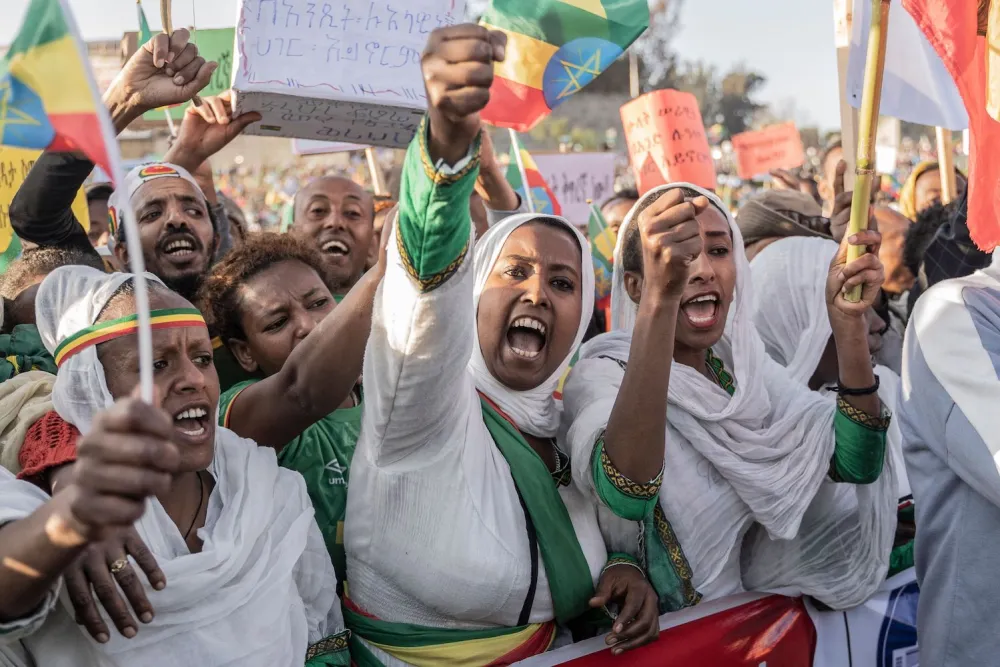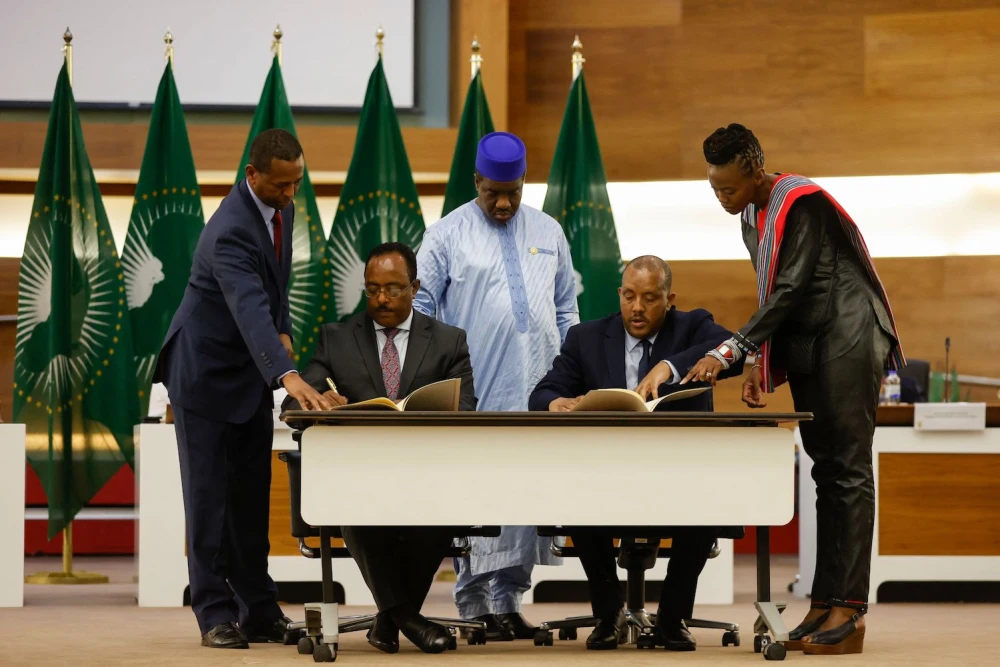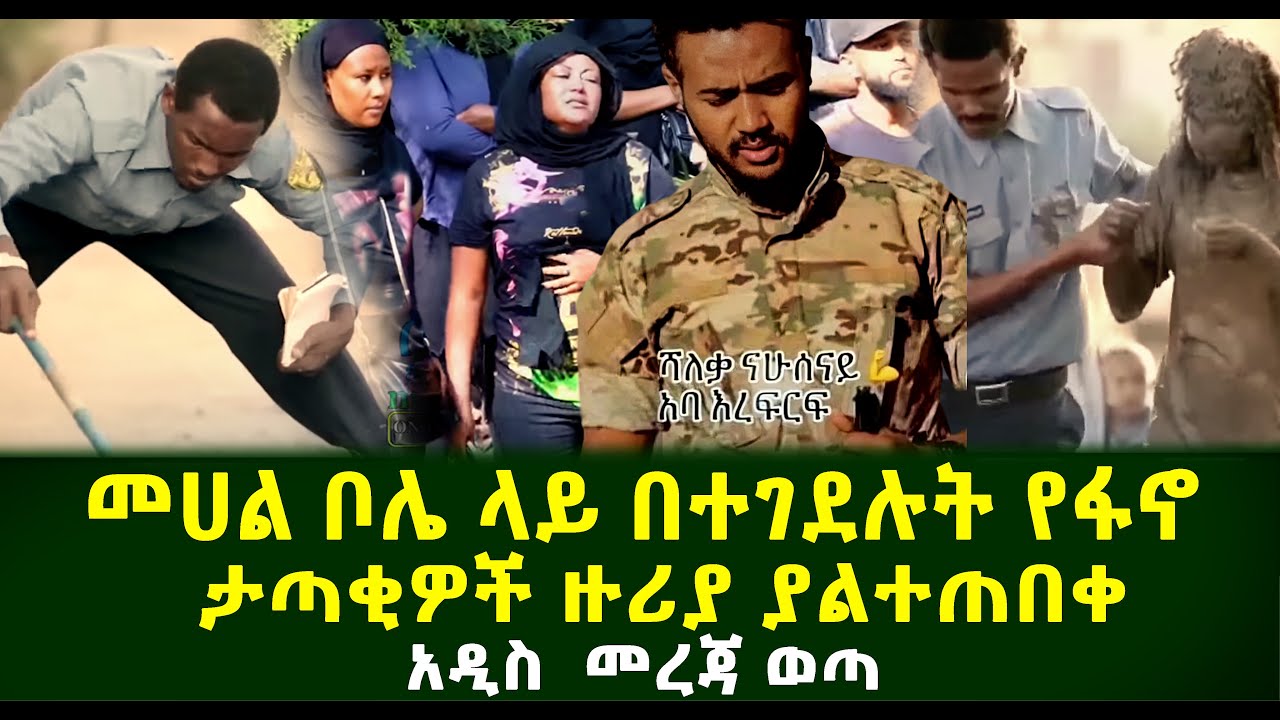
Without political reform, economic stability, and accountability there is a risk conflict could resume.
By Addisu Lashitew, Stefan Dercon, Christian Meyer, and Mehari Taddele Maru/AFP
 Redwan Hussein (sitting, L), representative of the Ethiopian government, and Getachew Reda (sitting, R), representative of the Tigray People's Liberation Front (TPLF), sign a peace agreement in Pretoria, South Africa on Nov. 2.
Redwan Hussein (sitting, L), representative of the Ethiopian government, and Getachew Reda (sitting, R), representative of the Tigray People's Liberation Front (TPLF), sign a peace agreement in Pretoria, South Africa on Nov. 2.Redwan Hussein (sitting, L), representative of the Ethiopian government, and Getachew Reda (sitting, R), representative of the Tigray People's Liberation Front (TPLF), sign a peace agreement in Pretoria, South Africa on Nov. 2. PHILL MAGAKOE/AFP VIA GETTY
On Nov. 2, Ethiopia’s government and Tigrayan rebels signed an unexpected peace deal aimed at ending two years of brutal war that drew in Ethiopia’s erstwhile enemy-turned-ally—Eritrea—while ravaging the Tigray region and surrounding areas, exacerbating ethnic tensions, and damaging Addis Ababa’s regional and global standing. Now that a deal has been signed, many questions remain: Will Ethiopian Prime Minister Abiy Ahmed’s ambitious reform agenda get back on track? Will there be economic stability? Will there be accountability for the perpetrators of war crimes during the conflict? Foreign Policy turned to a panel of experts to comment on the country’s future.
Ethiopia’s Peace Deal Exposes Abiy Ahmed’s Unfinished Reform Agenda
by Addisu Lashitew
When the conflict in northern Ethiopia escalated again this past August, few observers expected a quick resolution—but, paradoxically, it ended with a peace agreement in November.
Fighting the combined forces of Ethiopia’s federal army, Amhara regional militias, and Eritrea’s military, the chances of the Tigray People’s Liberation Front (TPLF) prevailing in a long civil war were always minimal. By signing a peace deal in November, TPLF leaders appear to have been forced to give up arms by their untenable military position.
The peace agreement may on its surface seem a humiliating defeat for the TPLF, a party that once ruled Ethiopia with an iron fist and played an outsized role as a regional power broker. However, it is also a pragmatic recalibration that demonstrates the astuteness of the party’s leadership.
The deal gives the TPLF a second lease of life and an opportunity to realize politically what it failed to achieve militarily.
The deal gives the TPLF a second lease of life and an opportunity to realize politically what it failed to achieve militarily. Ethiopia’s current constitutional order, which was largely crafted by the TPLF after it came to power in 1991, allows the party to exercise significant autonomy in administering Tigray. It also divides Ethiopia into competing ethnic fiefdoms.
The simmering competition between the Amharas and the Oromos, which seems to keep Prime Minister Abiy Ahmed busy, may erupt one day, giving the TPLF a political upper hand. By ensuring its political relevance, the TPLF has hence proved wiser than the expectations of its Western acolytes, who had anticipated that it would go on to launch an insurgency.
Overall, the TPLF played its few cards shrewdly. The agreement turns back the clock and places the TPLF at the same position that it would have been in had it peacefully ceded power to Abiy’s party prior to the outbreak of war in November 2020. With the signing of such a lopsided deal, the only risk for the TPLF is sidelining its support base.
Meanwhile, in Addis Ababa, a favorable peace deal will strengthen Abiy’s hand by stabilizing a fragile economy. While peace will be warmly welcomed by the war-torn country, it will eventually expose the prime minister’s unfinished reform agenda. The unabated war of the past two years has given an excuse to Abiy to indefinitely postpone the promise of radical political reforms that helped bring him to power. With the return of peace, these demands are likely to resurface.
Although Abiy introduced some important reforms early in his tenure, he has failed to pursue a genuine and inclusive reform agenda to heal the many political fractures that ail the country, instead opting for superficial changes that rotate around his own persona. If the tenure of the TPLF’s late strongman, Meles Zenawi, offers any lesson, it is the riskiness of building a political system around a powerful individual. Such a system will stand intact only until the demise of the individual.
Indeed, border disputes between regional states—most prominently between Amhara and Tigray—remain to be resolved. The country is still fighting a guerrilla war against the Oromo Liberation Army while attacks on ethnic minorities, especially on Amharas in Oromia, continue unabated.
On the economic front, the ruling Prosperity Party has abandoned the sharp focus of its predecessor, the Ethiopian People’s Revolutionary Democratic Front, on economic progress by forfeiting the vast catalyst role that the state used to play in the economy. Lacking a coherent ideology and a broadly shared purpose, the ruling party suffers from incompetence and decadence. This is apparent from the fickleness and arbitrariness of political decisions, the complete lack of accountability for regular ethnically motivated killings, and a surge of cronyism.
As the TPLF and the Ethiopian government start to implement the terms of their agreement, they should do so with the ultimate goal of averting a similar catastrophe in the future. Now is the time to build enduring institutions that can ensure that war will no longer be the means for resolving Ethiopia’s political differences.
Only Economic Stability Can Ensure That the Peace Agreement Holds
by Stefan Dercon and Christian Meyer
After almost two years, the government of Ethiopia and the Tigray People’s Liberation Front (TPLF) have agreed to stop their violent and destructive conflict and take steps toward political and security stabilization.
There are spoilers bent on disrupting this, both inside and outside Ethiopia. One of the biggest likely spoilers, however, is bound to be growing economic instability.
The international community, particularly the European Union and the United States, must support the cease-fire agreement by ensuring that there is a large economic upside to peace. The first step must be providing international political and financial support to ensure economic stabilization, followed by support for recovery.
It is clear that large parts of northern Ethiopia must be completely rebuilt, with some estimates putting the cost of reconstruction in the next three years up to $20 billion.
This monumental task is even more challenging given that Ethiopia’s macroeconomy is currently on the brink of collapse—and not simply because of the costs of the conflict. Like many countries around the world, Ethiopia has been hit hard by the global rise in fuel, food, and fertilizer prices. On top of this, rising internal and external debt service costs from the country’s infrastructure-led growth model, so applauded across the continent and beyond, adds additional strain.
How Eritrea Could Derail the Ethiopian Peace Deal
The Eritrean president has his own interests in Tigray, and they could undermine Ethiopia’s truce with the TPLF.
ANALYSIS |
MOHAMED KHEIR OMER
 People gather during a demonstration in support of Ethiopia’s armed forces in Addis Ababa, Ethiopia, on Oct. 22.
People gather during a demonstration in support of Ethiopia’s armed forces in Addis Ababa, Ethiopia, on Oct. 22.Ethiopia’s Other War
As peace talks progress in Tigray, tensions are mounting in Oromia.
NOSMOT GBADAMOSI
All this translates into a balance-of-payments crisis and rapid inflation. The black-market exchange rate for U.S. dollars is now around 70 percent, based on our observations in December, above the official exchange rate. International reserves will cover imports for less than one month, according to an Ethiopian government official, when at least three to four months is the usual minimal benchmark to avoid payments crises.
Even before the conflict began in late 2020, Ethiopia had started to implement reforms with a view to adopting a more market-led economic model and to stabilize its economy; discussions were taking place with the International Monetary Fund (IMF) to support this transition.
Today, international donors may be tempted to wait for more progress—particularly on accountability for crimes committed during the war. Indeed, based on our private conversations, it’s clear that many donors see blocking all economic and development support—such as limiting IMF, World Bank, or bilateral donor support—as a legitimate tool for pressure.
They should not delude themselves: doing so may make matters worse. Without international support and finance, not only will resetting the Ethiopian economy be impossible, but a deepening macroeconomic crisis will put all the gains toward peace and stability at serious risk.
Economic policymakers in Ethiopia now face the near-impossible task of both restoring the country’s macroeconomic stability and investing in reconstruction. Senior Ethiopian government officials told us they fear they won’t be able to pay the oil import bill later in December and next month’s civil servants wages. The political fallout in Addis Ababa and across the region will be a massive risk for further destabilization.
Deepening macroeconomic crisis will put all the gains toward peace and stability at serious risk.
The return of international economic support has to be seen as part of peacebuilding efforts, a way to protect livelihoods, and a means to ensure political stability. The first step has to be an accelerated approval of an IMF program to stabilize the macroeconomy, including exchange rate unification between the official and parallel markets. It should be accompanied by G-20 debt relief and essential multilateral and bilateral finance for stabilization and recovery. A clear route to restoring Ethiopia’s participation in the African Growth and Opportunity Act should also be on the agenda.
Economic stabilization followed by a recovery package for Ethiopia is in the interest of Europe and the United States. A clear push for accountability for crimes during the conflict should not be shelved, but it should be given the time it requires without forcing an implosion of the Ethiopian economy and fracturing the society further.
Thorny questions will no doubt be asked at both the political and technical levels. How should monitoring of the cessation of conflict, political dialogue, the path toward accountability, and other progress in implementation of the deal be sequenced with the release of funding? How will funding be fairly used in all conflict-affected areas? And how might Eritrea—a belligerent in the conflict but not party to the peace deal—try to benefit from incoming assistance or a broader reconstruction and recovery package?
While important, none of these questions should be a barrier to a robust reengagement. Identifying a clear peace dividend for all parties involved is the surest route to progress in the coming months.
For Tigrayans, There Can Be No Lasting Peace Without Accountability
by Mehari Taddele Maru
The harrowing experiences Tigrayans have suffered at the hands of the Ethiopian and Eritrean militaries and Amhara forces bring back painful childhood memories. Tigray was at the center of a protracted civil war in the 1970s and ‘80s, worsened by the Ethiopian famine from 1983 to 1985. Members of my own family, like thousands of others, were victimized by the actions of the Ethiopian military regime and the Tigrayan People’s Liberation Front (TPLF). While the latest deal gives cause for hope, lived experience reminds me there is a long way to go.
Many Tigrayans seem to believe that Tigray got the short end of the stick in the recent peace agreement signed last month in Pretoria, South Africa. Similarly, some express disquiet that the agreement contains provisions for disarmament of the Tigray Defense Force (TDF), with no attempts to address the root causes of the war. The feeling in Tigray is that with the disbandment of the TDF, the agreement has prepared the ground for exactly what Ethiopia and Eritrea want: a contained, depopulated, and weak Tigray. Indeed, no just peace can be achieved in Tigray as long as the population believes it is under the occupation of military forces it considers alien.
This dissatisfaction could lead to the emergence of a politics of resentment and discontent that could one day spark conflict, leading to a resumption of various forms of hostilities.
More than 5.2 million Tigrayans still are in desperate need of unimpeded, rapid, unconditional, and sustained delivery of humanitarian aid. Despite the agreement, civilians are still being killed and abducted, communication and other services such as public transportation remain suspended, aid trucks are being delayed, and aid is only trickling into limited areas mainly under the control of the Ethiopian and Eritrean forces.
The deal sets no timeline for humanitarian access and fails to explicitly mention the withdrawal of Eritrean and Amhara forces from Tigray, while providing strict deadlines for disarmament that have already proved extremely hard to meet. It also overlooks the need for building trust, managing political and security issues, and determining the will of the Tigrayan people.
The Pretoria deal undermines the much-needed accountability and remedies victims deserve.
Chief among many fundamental shortcomings, the Pretoria deal undermines the much-needed accountability and remedies victims deserve.
In its report, an independent U.N. body set up to investigate atrocities in Ethiopia and other human rights bodies have concluded that crimes against humanity, war crimes, ethnic cleansing, and acts of genocide have been committed during this war. They established that mass starvation, rape and sexual violence have been used as weapons of war. The U.N. report further states that “widespread acts of rape and sexual violence against Tigrayan women and girls” have been committed with the intent to “destroy the Tigrayan ethnicity.”
The deal empowers the Ethiopian domestic justice system to hold perpetrators from Ethiopia and Eritrea to account and dispense justice to victims. Owing to the industrial-scale atrocities committed, a trial of such magnitude would naturally involve a large number of victims and state-sponsored perpetrators from two countries. But the Ethiopian justice system has neither the required political independence nor the institutional capability to dispense fair, free, and speedy justice and hold perpetrators accountable.
What’s more, the overwhelming number of victims, mainly from Tigray, believe Ethiopian judicial institutions are part and parcel of the war on Tigray and the genocide against Tigrayans. Given that the Ethiopian government and its allies are the main perpetrators of the atrocities mentioned above, victims are unlikely to seek and receive independent and thorough investigations, fair trials, and effective remedies within Ethiopia’s legal system.
For victims in the Tigray region, the Pretoria agreement shatters their hope for justice. It failed to provide the victims with a mechanism for effective remedies and sends a message that might is right and atrocities will be tolerated, while victims are treated as collateral damage.
This sets a dangerous precedent that military victory justifies impunity, and the delivery of justice to victims of war crimes is a low priority. More importantly, without accountability, there will be nothing to deter ongoing atrocities in Tigray, Oromia, and elsewhere in the country. Efforts to prevent future atrocities in Ethiopia and across Africa will be undermined.
Any lasting peace agreement must be predicated on addressing the root causes of a war—namely, providing security against what Tigrayans see as an existential threat and assurances that atrocities won’t be repeated—while respecting the sovereignty of Ethiopia as a country.
Above all, the international community should work with the African Union and other partners to quickly set up an international mechanism that can ensure accountability and deliver justice to the staggering number of victims of the recent war. It is essential to sustain peace in Ethiopia and prevent a relapse into conflict.
Addisu Lashitew is an assistant professor at McMaster University and a nonresident fellow at the Brookings Institution. Twitter: @AddisuLashitew
Stefan Dercon is a professor of economic policy at Blavatnik School of Government and the director of the Centre for the Study of African Economies at the University of Oxford.
Christian Meyer is the director of the Oxford Martin Programme on the Future of Development at the University of Oxford.
Mehari Taddele Maru is a professor and academic coordinator at the School of Transnational Governance at the European University Institute in Florence, Italy. He is a scholar of peace and security, law and governance, strategy and management, human rights, and migration issues. Twitter: @DrMehari
https://zehabesha.com/will-ethiopias-peace-deal-last/

No comments:
Post a Comment